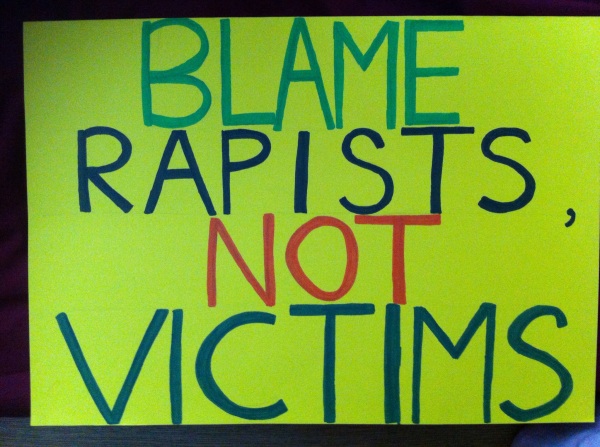
My placard for the day
On 24 January 2011, a Toronto police officer gave a talk on crime prevention. When speaking about rape, he uttered the now infamous words, “Women should avoid dressing like sluts.” Enraged at his words and the culture of victim-blaming it reflected, Canadians marched to let everyone know that women’s clothes were not responsible for rape; rapists were. Although it was a Canadian police officer who had made those comments, the rape culture that gave rise to the sentiment was not confined to Canada. Women from around the world recognised it, shared their outrage, and have joined in the movement, with Slutwalk protest rallies popping up in more than 40 countries so far.
From the start, Slutwalk has been controversial, even among feminists. Some seek to reclaim the word ‘slut’, to redefine it to mean a sexually liberated woman, instead of a judgmental term used to cast aspersions on the morality of the woman to whom it is addressed. Still some wish to use the word to include all women, to demolish the idea that some women are more valuable than others based solely on a patriarchal notion of feminine purity. I’ve heard it said that “if we’re all sluts, then the term can no longer be used to divide us.”
However, many feminists, myself included, find the reclamation of the word ‘slut’ to be deeply problematic. We could insist on its redefinition, refuse to see it as an insult, but I don’t think it is possible to wipe the slate completely clean. Regardless of what we might say, sexist people will continue to use the word as an insult, and even when not intended to be used as such, historical connotations will hang off it, baggage reminding us of and reinforcing our oppression. Personally, I think the word ‘slut’ should be wiped from our vocabulary, ideally together with the words ‘virgin’ and ‘prude’. Although they are occasionally used to refer to men, it is common knowledge that women are overwhelmingly the targets of such terms. The very existence of these words places undue importance on a woman’s sexual activity, so much so that it is bound up in her identity. There is no word no describe a person who has yet to learn to drive, no word to describe someone who has never been swimming. Why are we not content with people being able to say, “I’ve never had sex before,” or “I enjoy sex and engage in it frequently?” Why do we see the need to encapsulate their sexual experience (or lack of it) in a label? When applied to women, these identity tags become even more damaging, cementing the idea that women exist as vessels for the sexual pleasure of men, and thus can be viewed as ‘used’ or ‘unused’.
For all that, I decided to attend Slutwalk London yesterday, because Slutwalk is about so much more than the word ‘slut’. While even within the march itself, opinion was divided as to whether we should call ourselves ‘sluts’, there was one thing that everyone could agree on, and that was the notion that the only one responsible for rape was the rapist.
I had never been to a Slutwalk before, and was very moved by the experience. There was a huge turnout, of women as well as a good number of men, bearing placards denouncing the culture of victim-blaming. Here are a few snapshots:
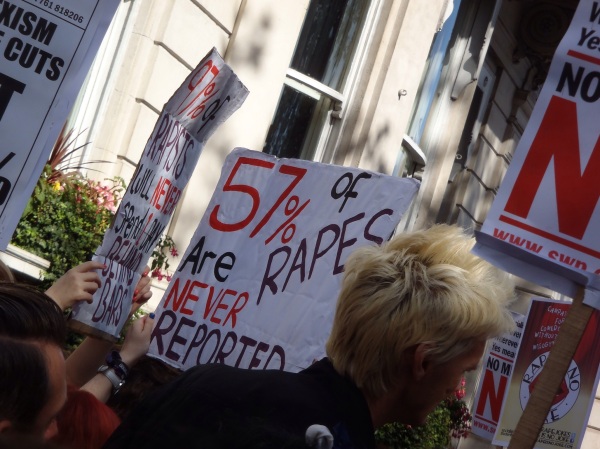
“57% of rapes are never reported”, “97% of rapists will never spend 1 day behind bars”
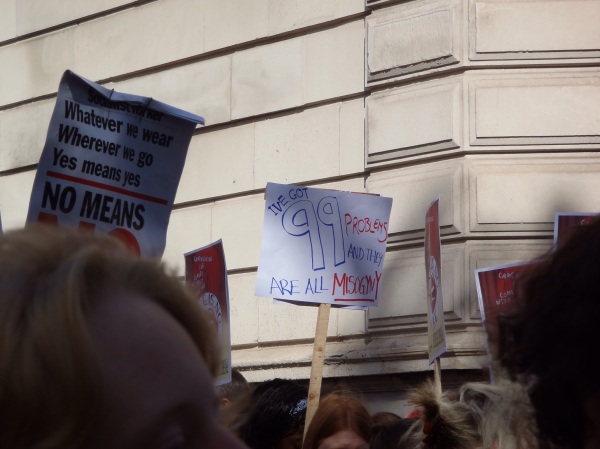
“I’ve got 99 problems and they are all misogyny”
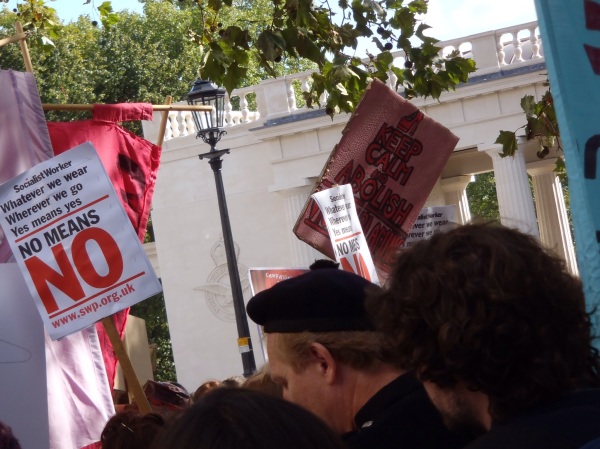
“Whatever we wear / Wherever we go / Yes means yes / No means no” , “Keep calm and abolish victim-blaming”
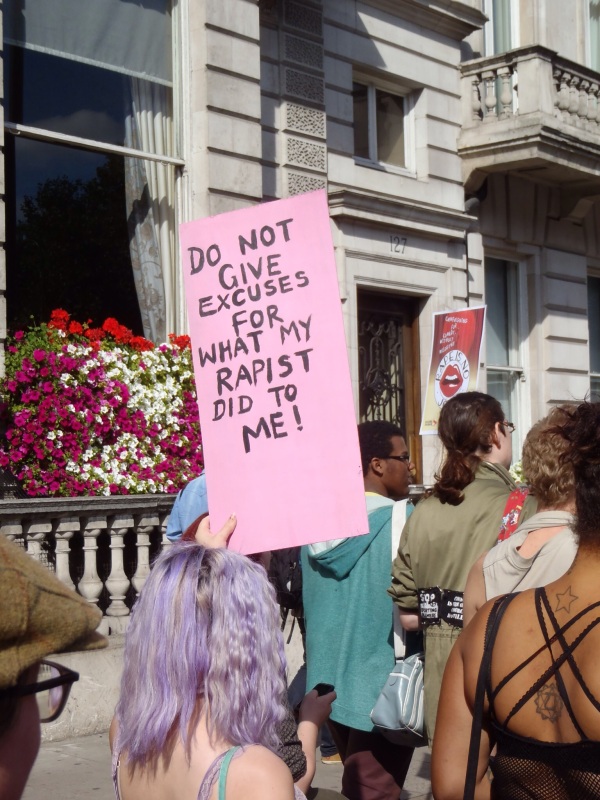
“Do not give excuses for what my rapist did to me!”
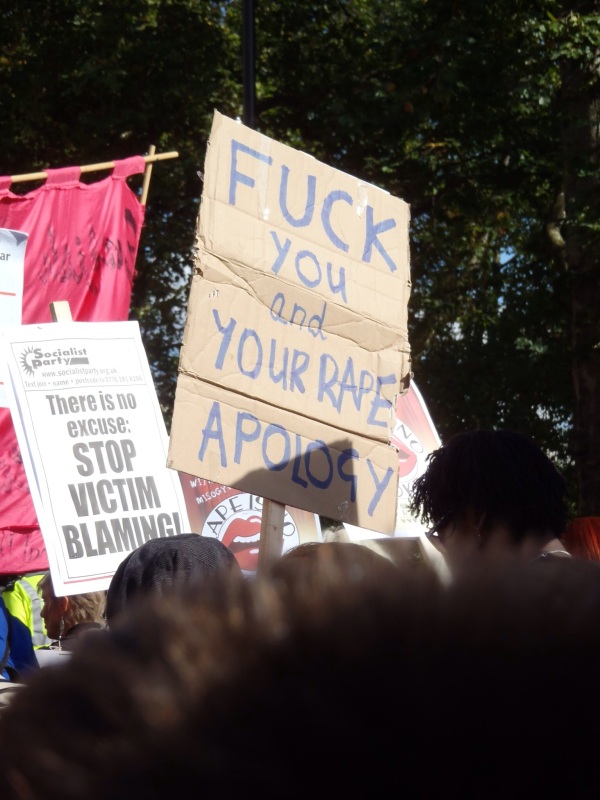
“Fuck you and your rape apology” , “There is no excuse: stop victim blaming!”

“Things that cause rape: (1) Rapists (2) See above”
As we marched, we chanted refrains such as, “Whatever we wear, wherever we go; yes means yes and no means no”; “We’ve said it once and we’ll say it again, no excuse for violent men”; “Two four six eight; stop the violence, stop the rape”, among others. We called to end the shaming of women, to assert that women who wear revealing clothing are not ‘sluts who are asking for it’, and that women who do not wear revealing clothing are not ‘uptight prudes who need a good seeing to.’ We called for the right to dress and have sex on our own terms, not the patriarchy’s. We called for rape cases to be taken seriously by the police and for the public to stop being rape apologists. And at the end of our march, many brave women, most of whom were survivors, shared their stories with us.
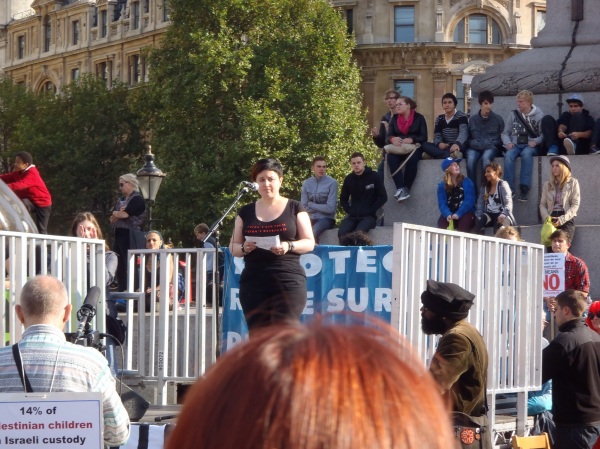
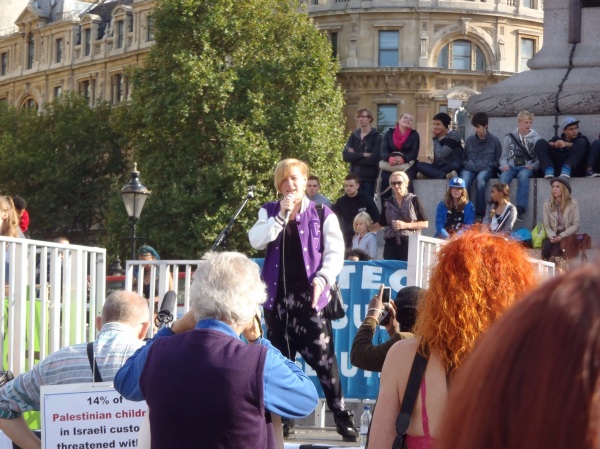
“Don’t Chat to me” – a poem about street harassment
Diversity and inclusivity was the order of the day. We heard the story of young women who had struggled with the justice system after being raped; the story of a mother whose daughter had been raped at the age of 16, and whose rapist had got away with it; the story of a trans woman battling with the constant discrimination and threat of sexual violence; stories about women with disabilities being denied their rights; stories about how sex workers face prosecution from the police instead of protection; the story of a gay man who had been raped, and dismissed by the homophobic police officer he reported it to. Two excellent poets also recited their work, injecting an upbeat note into the atmosphere. For me, the most harrowing but moving account came from a woman from the Caribbean, who had immigrated to the UK. She spoke about how she and her daughter had been raped and beaten up by a group of men, who forced her to smuggle drugs into the UK. If she did not do so, they warned, they would kill both her and her children. With no choice, she complied, only to be arrested in the UK and sent to prison for 9 years. She was subject to rape again in the UK, reported it, and faced discrimination and racial abuse, with her immigrant status used against her. In the end, her rapist got off scot-free. Despite all this, her strength and courage were astounding. To this day, she continues to fight against rape and for justice for rape survivors, and proclaims, “No matter what they do to me, I will not give up! I will keep fighting.”
Ultimately, this diversity made Slutwalk London a big success. It drove home the message that, when it comes to sexual violence, we are all in this together, regardless of class, immigration status, race, sexuality, being able or disabled, cis or trans. We may not all agree as to what should best be done with the word ‘slut’, but we are united in the notion that we must not allow it to be a word that is used to divide us, with ‘respectable’ women at one end and ‘loose’ women on the other. Because our sexual activity, or lack of it, is irrelevant. And no woman deserves to be raped.
Being from Toronto and having attended SlutWalk both years, it’s very exciting to see how global this Walk has become!
I’m all about reclaiming language and have found reclaiming slut to be very healing. Feminism will never agree with itself but I do think it needs to respect the other parts. I have found that I have the ability to respect why women would not want to be associated with the word “slut” but I have been shamed by other women for wanting to take it back and I feel that is unacceptable.
LikeLike
Yeah, it’s pretty amazing how many countries now have it, especially considering the fact that the original incident took place only a year ago.
I agree with you completely; every feminist will have their own views on the matter, and we shouldn’t be shaming each other or insulting one another for different views. Funny you should mention it, because just yesterday I was unfollowed by another feminist on Twitter because I had tweeted in support of Slutwalk. She claimed that it was ‘funfeminism’, not ‘the genuine article’ and so on. I think feminists have a big enough fight with the mainstream without fighting amongst ourselves too.
LikeLike
I have to laugh at the situation sometimes. We want women equality with men but women can’t even give it to other women!
LikeLike
This is so true. Terms like slut, bitch, skank, etc, are thrown around between women like they are funny and we are liberated for reclaiming them, but these words are inherently judgmental. We can march for the sexual equality of women but until we stop judging our own sex, we won’t convince anyone.
LikeLike
Yes! We need to lead by example!
LikeLike
Good point. Typically when words are reclaimed, they can still sting when used in the old context.
LikeLike
Yeah, which I guess is why it’s still unacceptable for white people to refer to black people using the n word. The historical connotations of oppression can’t just be removed like that, we can’t just make ourselves forget.
LikeLike
Great post.
I believe society needs to be re-educated on sexual assault. From sensationalised media deliverance, I feel people consider rape or assault to be between a girl walking a dark alley and a stranger emerging from the bushes. Most cases of assault are less obvious, where both, victims and their perpetrators are unclear of what constitutes serious unacceptable behaviour. I’ve spoken to many rape victims who haven’t reported the act, as they weren’t confident as to what was a ‘hook-up being taken too far’, or an actual a crime. I’m sickened that these men will continue walking around living their lives not acknowledging the fact that they are in fact rapists, and not just drunk Casanovas who once pressured their high-school girlfriend into having sex. If it’s not 100% yes, it’s a no and therefore, it’s a crime.
I personally detest the term, ‘slut’. It is old-fashioned and extremely judgmental. I feel that ‘claiming it back for the women’, will only move feminism’s progress back. If people have a word (regardless of whether it’s positive or negative) that labels a specific minority, it only reinforces that they are ‘the other’. I’m up for equality, I don’t want a title for a woman’s sex life. Promiscuity is for everyone.
LikeLike
I agree. I remember reading about some survey whereby a large proportion of college men admitted to rape, as long as the word ‘rape’ wasn’t used in the question. They thought rape meant stranger rape, jump-out-and-grab-her rape, not realising that as long as you don’t have consent, it’s rape.
I don’t think it’s necessary, but if society -really- wants a handy word to describe someone who is sexually promiscuous, they should create a whole new gender neutral term that is non-judgmental, to describe both men and women. I don’t like the word ‘slut’, and I also don’t like the male equivalent of ‘valentino’, ‘playboy’, ‘player’ etc, because these have positive connotations for men, reinforcing a misogynistic, rakish ideal of masculinty. So much sexism is embedded in our everyday language that really works to keep us down, it’s worth a whole blog post in itself. In Sweden they’ve made an effort to revamp their language to minimise gender prejudice, I wish the English language would do the same.
LikeLike
Pingback: An Image Worth 1,000 Emotions « Your Mum is an Equality Illusion
Reblogged this on DOG Sharon and commented:
This interesting article brings the personal and the political together.
LikeLike
Thanks! =)
LikeLike
Good article mate
LikeLike
Pingback: Slutwalk London 2012: Brave survivors get strong! « The Free
I remember being highly in favor of the Slutwalks when I first heard about them, although when I pointed them out to a friend, she had similar things to say about reclaiming the word ‘slut’ – http://www.stormtiger.com/collie/bestiary/2011/09/slutwalk-thoughts/ . For myself, I don’t know how to feel about ‘reclaiming’ words. I always liked it when Margaret Cho did it, for ‘Fag’ and even ‘slut’ to a lesser extent. The thing, of course, is that any word that we might assert is positive can be turned into a slur. ‘Liberal’. ‘Socialist’. Even ‘Feminist’. While old words might carry baggage, it’s true, that will not stop haters from hating, so to speak. And more importantly, words only have the power we let them. Anyone that’s been bullied in school knows that. Of course, it’s easy for me to say that, not being a woman or a minority… 😛
But tangentally, referring to these gatherings as Slutwalks might have a good outcome: using the charged word is more likely to get peoples’ attention, which increases the likelyhood for people to hear what women and men have to say about misogyny and slut-shaming, and rape, and all that other stuff. My girlfriend puts on one woman performances that include the names ‘Phone Whore’ (literally, about being a phone sex operator) and Slut (R)evolution (about the growth of her sexuality over the course of a lifetime), and I’ll bet you that the names get butts through the door to experience a performance that is not demeaning in the slightest.
In the end, I think we should keep talking about ‘slut’. It will only help us come to a better answer.
LikeLike
That’s a good point there – that using a charged word might garner more publicity in the general populace, allowing feminist ideas to become more mainstream. And I guess Slutwalk has been successful with that, by opening the public’s eyes to certain ideas that are usually restricted to the realms of academic theory.
I suppose the only thing with such stunts is that the media may choose to fixate on the word ‘slut’ and perve on women who attend in skimpy outfits, at the expense of the wider point of Slutwalk. That’s certainly happened in a few non-feminist-friendly publications.
Thanks for the comment!
LikeLike
I really enjoyed reading your insights on SW. Like many people, I have been iffy about this movement, but I also recognize that many women have felt very empowered by it and gained so much from the experience you described. I LOVE to see discussions about consensual sex and anti-violence in our communities, but I admit that I have some work to do in reflecting upon and reclaiming the word “slut”. I was very happy to read that the event supported a variety of voices, that is so important. Excellent post.
LikeLike
Thank you. =)
LikeLike
Just in regard to the poster that reads, “Fuck you and your rape apology”: I’d like people to consider that the phrase ‘fuck you’ is verbal rape or a threat to rape.
LikeLike
That’s a very good point, thank you.
LikeLike
Thank you so much for writing this! This is actually the very reason I commenced writing my blog (Feeling Good About Feminism). I felt as you do that it isn’t right to divide women by hurling historically-frought words (slut, for example) at us, and because of the baggage of these words, it’s so difficult to conceive of reclaiming them (I don’t desire to, honestly… I just don’t want to hear it!). You wrote this so well, and expressed what I’ve felt I need to express through my blog. I am effusive with praise, I know, because I am so grateful for women who are doing the same work that I am, challenging as it is. And the praise is well-deserved. 🙂
Blessings.
~M
LikeLike
Thank you for your lovely words! Fighting for the cause is indeed challenging, so to hear the support of like-minded feminists is wonderful. I’m sure that all together we can make a difference in this world. =)
LikeLike
“Women should avoid dressing like sluts.”
That isn’t taking the blame away from the rapist and turning it to the victim. That’s called advising people on what behaviour they should adopt from a cop’s point of view to avoid becoming a victim. Not too pc as a statement but very clear.
Would you blame a bartender if he said to you “Girls, don’t leave your handbags unattended.”?
But you know what?
Do what you like.
LikeLike
This whole post is very moving, and I’ve thought a lot about what you said of the word ‘slut’. It’s exactly what I think of words like fag and dyke. Some people want to reclaim those words, but it’s never going to work because other people will continue to use them as insults. I was talking to one of those people a few days ago(I have classes with her) and she said that “if gay people are using it, why shouldn’t I?” And I think this applies to the word slut as well. There will always be people who use this kind of “logic”, so we would be better off to show a united front that will not accept any use of these words. But that’s just what I think.
LikeLike